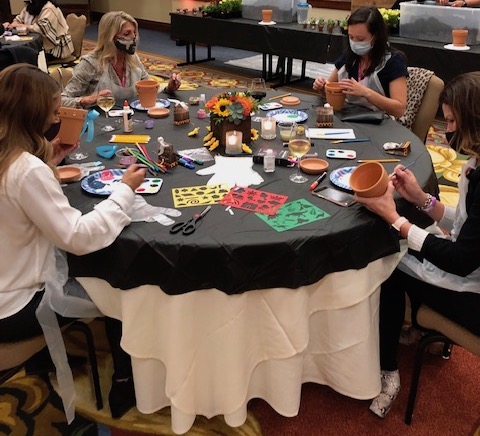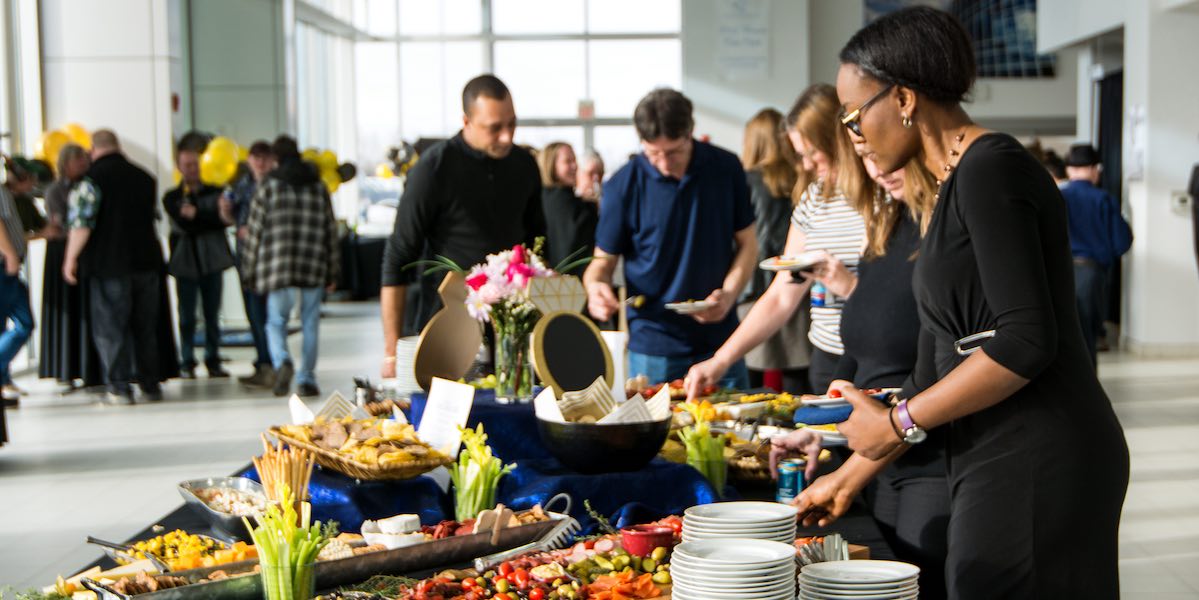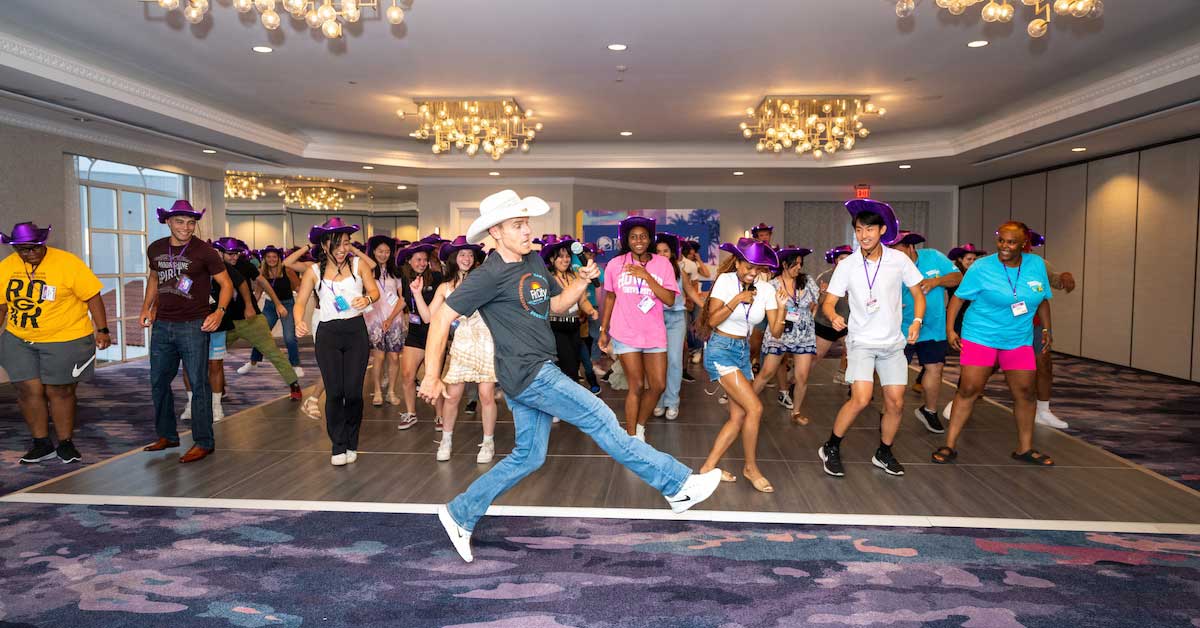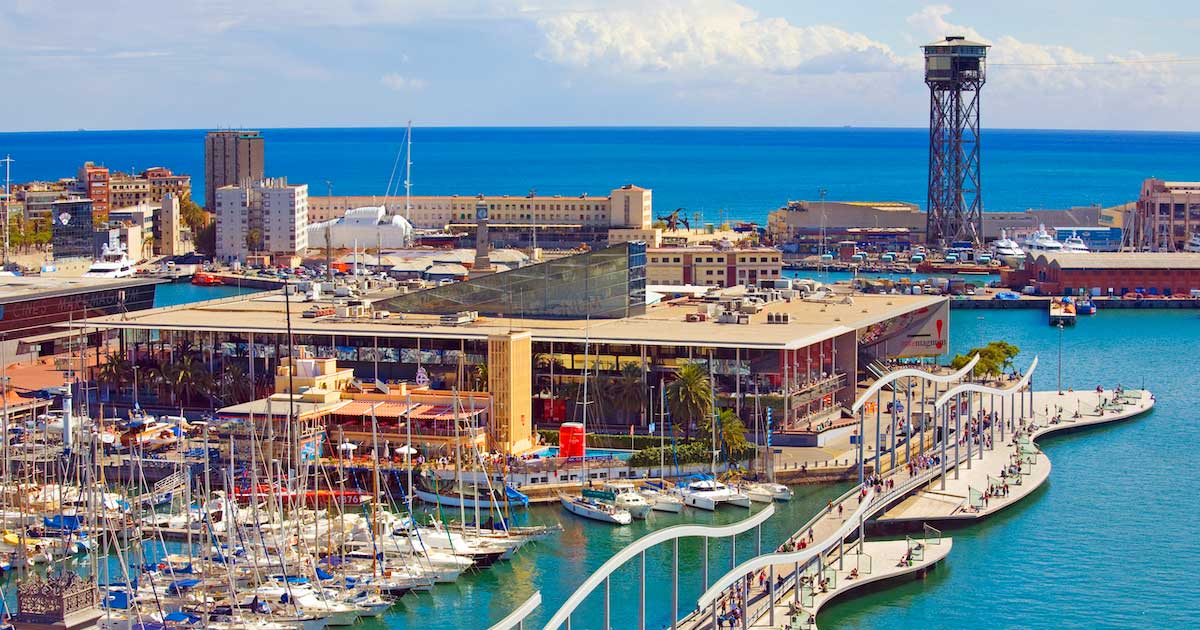This article is from the January issue of The Meeting Professional, which features an advocacy theme and is sponsored by Caesars Entertainment. Look for the full issue later this week.
A Caesars Entertainment party is usually one of the premier networking occasions that coincides with MPI’s annual World Education Congress (WEC). But like just about everything else in the world, things were a little bit different in 2020.
First, WEC Grapevine (Texas) was moved from June to November due to the COVID-19 pandemic and became a hybrid event featuring 800 in-person participants and more than 1,100 virtual participants. And the Caesars party? That became an opportunity for top customers to come together for a very good, and timely, cause.
“This year we created an intimate experience called Plant Some Sunshine for our top 50 customers that allowed for socially distanced networking,” says Alexa Kinney, national sales manager, in-market for Caesars Entertainment. “Caesars Entertainment partnered with Hello! Destination Management based in Dallas and the local community to bring happiness by decorating colorful planters that were given to assisted living facilities.”

She says more than 50 plants were delivered to assisted living facilities, and that the reaction from the residents was heartwarming.
“Many of us know of someone in an assisted living facility and how difficult of a time it is for them right now,” Kinney says. “Our event provided us an opportunity to bring some joy to seniors not able to see their family and loved ones, in most cases, due to restrictions. Everyone at the event contributed and felt touched by the experience—it was a very special event.”
Robert Sanchez, CMP, director of national accounts for Global Cynergies and president-elect of the MPI Dallas/Fort Worth Chapter, says Caesars is a key partner when he’s sourcing venues for clients. He participated in the Plant Some Sunshine event because it touched him personally.
“My family has been affected by Alzheimer’s, and this was a memorable experience to impact our seniors,” he says. “In addition, with COVID-19 isolation restrictions it is imperative to encourage them, as they might be lonely and scared. The impact of strangers uniting to bring hope, joy and kindness to so many is an experience I will cherish for many years and look to recreate at future events.
“It is important to have corporate social responsibility (CSR) events to make an impact for those in need, bring people together and create memorable experiences.”
“The impact of strangers uniting to bring hope, joy and kindness to so many is an experience I will cherish.”
Jennifer Chreitzberg is executive assistant and manager of meetings and events for Plano, Texas-based Cinemark, which partners with Caesars for events such as CinemaCon and its own employee conventions. She enjoyed the Plant Some Sunshine event because it was a rare (in 2020) opportunity to see friends and co-workers, but the activity and cause were important to her as well.
“I loved painting the plant, as I don’t get to do crafty stuff like that,” Chreitzberg says. “I believe this event shows some type of normalcy out there. It gives people the opportunity to feel like they still belong and are a part of something.”
Kinney, who is based in the Dallas/Fort Worth area, says that in addition to building CSR programs at the corporate level, Caesars Entertainment encourages team members to build CSR programs into events in their local markets as well.
“I enjoy getting involved and giving back to my local community,” she says. “It is important to me that I stay connected to the current issues and challenges so that I can design programs that will provide a positive impact.”
Moving Forward with Meals on Wheels
One way that Caesars Entertainment is helping seniors on a national level is through a partnership with Meals on Wheels America. Support from the Caesars Foundation enables the group to “raise awareness through March for Meals, deliver vans to local programs that need them and provide support to ensure that no senior is alone or hungry.” The Caesars Foundation has also provided underwriting for groundbreaking Meals on Wheels America research on the prevalence of senior hunger.
Gwen Migita, vice president of social impact, sustainability, diversity, equity and inclusion for Caesars Entertainment, says that in response to seeing increased levels of senior isolation, the Caesars Foundation funded piloting for a new Meals on Wheels America program called Friendly Visitor.
“It’s been found that a second visit or a second knock, or having that volunteer visit a senior in a home, dramatically reduces social isolation, dramatically increases mental health and reduces stressors related to isolation,” she says. “The program has been expanded, and now it’s an initiative in many states for Meals on Wheels.”
In June, Meals on Wheels America and Caesars Entertainment hosted the virtual National Social Isolation Summit featuring participants from academia, health sciences and the federal government.
“What are the core issues that should be worked on as a collaboration?” Migita says.
MPI Webinar: Striving for sustainable excellence?“What does a collective action look like when it comes to social isolation with seniors? And how do companies, even in the private sector, work through it in a more relationship-based approach?”
Julianne Holt-Lunstad, PhD, professor of psychology and neuroscience at Brigham Young University, was the National Social Isolation Summit keynote speaker and said that although tech-based solutions are being relied upon heavily during the pandemic, we must be sure we’re reaching those most in need.
“In collaboration with my colleagues at the University of California San Francisco, we have some preliminary data on the experiences of older adults in the San Francisco area during the early time of the COVID pandemic collected via telephone surveys,” she said. “What we found was most older adults use telephones as their primary means of connecting. Four out of five had little or no video contact, and 28 percent reported having no internet. We must think beyond access to ensure that [digital] solutions are actually effective for reducing social isolation and loneliness.”
Holt-Lunstad highlighted the true severity of social isolation and loneliness during the summit.
“As we’re facing a deadly virus, why should we care about social isolation and loneliness?” she asked. “It’s important to recognize that social isolation and loneliness isn’t about just being miserable. Social isolation and loneliness can actually be deadly. There’s evidence of increased risk of death from all causes. And my research that includes data from more than 3.4 million participants shows that loneliness can increase risk for earlier death by 26 percent, social isolation by 29 percent and living alone by 32 percent. Conversely, being socially connected is protective and increases the odds of survival by 50 percent. So, across decades of research, we now have evidence that the health risks are comparable to smoking up to 15 cigarettes per day and exceed that of obesity and air pollution.”



.jpg?sfvrsn=96553155_1)



